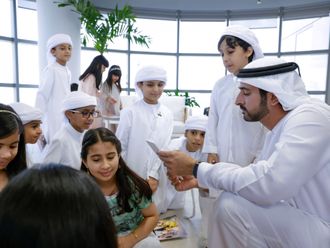Abu Dhabi: An employment project targeting people with special needs, known as a sheltered factory, will soon be available in Abu Dhabi to help provide tailor-made job opportunities for individuals with special needs, Gulf News has learned.
The employment factories are designed to help mentally and/or physically charged individuals, to take part in various manufacturing capabilities.
Some of the products that individuals take part in producing include: furniture (wooden and metal for offices, schools and domestic use); textiles (garments, bed linen, protective clothing, hospital and surgical garb — with printed or embroidered logos); metal work (shaped and welded construction); leather work; canvas work; book binding (beautifully crafted leather binding with gold lettering); and screen printing (printing onto promotional products - for instance T-shirts, logos, caps, linen, flags, bunting, banners.
The shelter will help accommodate 400 people with special needs by 2012, according to Mariam Saif Al Qubaisi, head of the Special Needs Centre of the Zayed Higher Organisation, who spoke about services to be offered to individuals with special needs in the emirate, during the centre's fifth annual conference Access Abu Dhabi 2011, which kicked off yesterday.
"The Abu Dhabi sheltered factory will provide the necessary technology and facilities needed during a day-to-day job for people with special needs. The Western Region Residential Area, a smaller-scale sheltered factory is also due to open its doors to individuals with special needs within the next five years," Mariam said.
A nearby day-care centre in the Western Region, is due to open during the same time, offering vocational training workshops. A dedicated residential area will also offer 50 beds for orphans or individuals with special needs who have nowhere to stay.
A special team from the Zayed Higher Organisation (ZHO) for Humanitarian Care, Special Needs has been dedicated to offer job placements and support for individuals with special needs.
"We make sure those who are ready to enter the work-force are offered proper vocational training before they are employed in a company, and that the company concerned has suitable facilities that can help accommodate the individual's needs," she said.
The Al Ain Assessment and Therapy Centre is also due to provide day-care for up to 500 students with special needs by September. The 4,400 square metre centre will offer a bridging programme for patients who have just been discharged from hospital and are ready to go home, through a nearby residential area with 15 beds.
In addition, a new 90-bed residential area adjacent to the current day care facility at ZHO in Abu Dhabi will be ready to accommodate people with multiple disabilities and severely disabled people who age 16 or older by the end of the year.
Children (above three) and adults with special developmental or physical needs will be offered 300 sessions of therapeutic horseback riding or Hippotherapy at a stable near the centre.
She said Hippotherapy was one of the most successful therapies for children with special needs. On the sidelines of the conference, Mohammad Fadil Al Hameli, Secretary General of the ZHO, spoke to Gulf News about the importance of exploring new ideas to help improve teaching methods for individuals with special needs.
"We have noticed from our five-year annual conference on special needs that without strong leadership methods our initiatives won't go anywhere. That's why this year's conference explores ways to improve community services in general," said Al Hameli.
The ZHO is currently exploring ways to upgrade their current training methods. "This requires a lot of interaction with the educational institutes. The 21st century has become a screenage century and not a teenage one. We need to find ways to modify that practice and focus more on applied knowledge," he said.
Different areas
- Zayed Higher Organisation for Humanitarian Care and Special Needs consists of:
- 1,200 students with special needs across 14 centres in Abu Dhabi, Al Ain, Western Region
- 95 per cent of students are Emiratis
- 120 students in 2011 were enrolled in normal schools
- 118 adults have been trained and employed in 2011
- 54 ambassadors are recruited across the Emirate of Abu Dhabi to help assist the children
Special needs cases include:
- Visual impairment
- Mental/physical disability
- Deafness
- Epilepsy/spasm
- Paralysis












